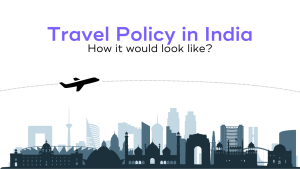In today’s world, businesses are increasingly aware of their environmental impact. As a Chief Experience Officer (CXO), you play a crucial role in leading your company towards more sustainable future. And when it comes to business travel you can do so by a sustainable travel policy.
The Indian government is making significant strides towards promoting sustainable travel by implementing a range of innovative policies, developing green infrastructure, enhancing public transportation, and encouraging eco-friendly practices across various sectors.
With the help of this blog you can align your travel policies with Corporate Social Responsibility (CSR) and Environmental, Social, and Governance (ESG) principles.
What if you can implement these practices into your travel policy & make it sustainable. This article covers all the questions.
But before proceeding further let’s understand what CSR & ESG is?
CSR (Corporate Social Responsibility)
CSR stands for Corporate Social Responsibility. It’s a way for companies to give back to society and show that they care about more than just making money. When a company practices CSR, it might:
- Donate to charities or support community projects.
- Make sure their products are safe and environmentally friendly.
- Treat their employees fairly and provide good working conditions.
ESG (Environmental, Social, and Governance)
ESG stands for Environmental, Social, and Governance. It’s a way to measure how responsible a company is in three specific areas:
Environmental: How does the company impact the planet? This includes things like reducing pollution, conserving energy, and managing waste.
Social: How does the company treat people? This covers how they interact with employees, and the community. It includes diversity, human rights, and community engagement.
Governance: How does the company run itself? This involves the company’s leadership, executive pay, audits, internal controls, and shareholder rights.
So, when you hear about a company engaging in CSR or focusing on ESG, it means they are trying to operate in a way that is good for society, good for the environment, and good in terms of ethical business practices. It’s about being responsible and thinking about the bigger picture beyond just making money.
What is the Travel Policy & How to make it sustainable?
A travel policy is a set of rules made by your company or organization for you and your employees when you need to travel for work. It tells you where you can stay, how much money you can spend, and what expenses will be covered. It’s there to help you know what to do and to make sure everything is fair and organized when you’re away from the office.
A sustainable travel policy is a set of guidelines aimed at reducing the environmental impact of business travel while promoting economic and social benefits. It’s about being a responsible traveler, considering how your journey affects the world around you.
Why does a company need a Sustainable Travel Policy?
Have you ever thought about the impact your business trips have on the environment and your company’s bottom line?
1. Reduce Environmental Impact
Every time you travel for business, you contribute to carbon emissions. A sustainable travel policy helps you:
Cut Down Emissions: By choosing eco-friendly travel options, like trains over planes, you can significantly reduce your carbon footprint.
Promote Green Practices: Encourage the use of public transport, carpooling, or staying at eco-certified hotels.
2. Boost Your Company’s Image
Adopting sustainable practices shows that your company cares about the environment. This can:
Enhance Reputation: Clients and partners will see you as a responsible and forward-thinking business.
Attract Talent: Many people, especially younger employees, prefer to work for companies that prioritize sustainability.
3.Support Corporate Social Responsibility (CSR) Goals
If you’re committed to CSR, a sustainable travel policy is a natural fit. It helps you:
Show Commitment: Demonstrate your dedication to reducing negative impacts on society and the environment.
Enhance ESG Performance: Improve your Environmental, Social, and Governance (ESG) ratings by integrating sustainable practices into your travel policies.
4. Stay Ahead of Regulations
Governments are increasingly focusing on environmental regulations. A sustainable travel policy helps you:
Stay Cooperative: Ensure that you’re meeting all the latest environmental laws and regulations.
Mitigate Risks: Avoid potential fines and damage to your company’s reputation by being proactive.
A sustainable travel policy isn’t just about being green—it’s about being smart. You’ll save money, enhance your company’s image, stay compliant with regulations, support local economies, and improve your employees’ well-being. Plus, you’ll be doing your part to protect the environment.
How to create a Sustainable Travel Policy?
To create a sustainable travel policy, start by looking at how you and your team currently travel and identify areas for improvement by using this steps:
1. Assess Your Current Travel Practices: Take a look at how you and your team currently travel. Figure out what you’re doing well and where you can improve.
2. Set Clear Goals: Decide what you want to achieve with your sustainable travel policy. Maybe you want to cut down on flights or choose hotels that care about the environment.
3. Educate Yourself and Your Team: Learn about the benefits of sustainable travel, like reducing carbon emissions and supporting local communities. Share this knowledge with your team so everyone understands why it’s important.
4. Provide Guidelines: Give your team clear guidelines on how to make greener choices when they travel. This could include using public transportation, staying in eco-friendly accommodations, or reducing waste.
5.Offer Incentives: Encourage your team to follow the policy by offering incentives, like rewards for choosing sustainable travel options. This can motivate everyone to make positive changes.
6. Track Your Progress: Regularly check how well you’re doing with your sustainable travel goals. If something isn’t working, don’t be afraid to adjust your policy to make it better.
Conclusion
Creating a sustainable travel policy is not just about reducing carbon emissions; it’s about showing that your company cares about the future. It’s about making smart choices that benefit both the environment and your business. By implementing a few straightforward guidelines, you can make a big impact.




